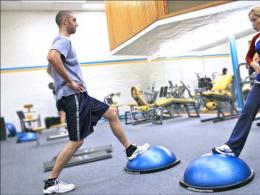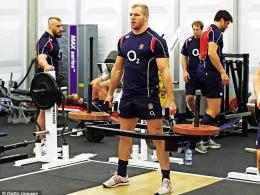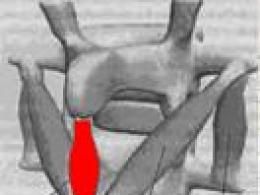Meal plan for gaining muscle mass. Festive overeating Sports nutrition diet 5000 kcal
We warmly welcome those who no longer know how to dodge, but eat more calories. Well, you, losing weight, also read how people eat.
Often, trying to fit into their KBJU, dinner is made with minimal calories. We did exactly the opposite: we sat, thought and prepared a set of two dishes for as much as 5500 kcal. One of Zozhnik's founders had homemade sesame-butter mayonnaise pork with Robuchon's mashed potatoes for dinner, and a blueberry milkshake with whipped cream for dessert.
Meat

Meat, of course, took the fattest - pork. Well, they didn’t particularly trifle: they took a juicy piece in 330. They sprinkled the meat with spices and thoroughly beat it up with these deft hands of theirs. Then olive oil was poured into a frying pan and this piece of flesh was thoroughly browned. Then they put the meat in a fireproof form on top of rosemary sprigs, and began to make homemade mayonnaise. Yes, not a simple mayonnaise, but on sesame oil (it seemed to us that it would be more sincere). In general, the yolks from the morning omelet finally came in handy. We took one egg yolk, 20 g of wonderful Moutarde au Poivre Vert mustard with green pepper, 50 g of sesame oil and beat the whole thing with a mixer.
They flavored the meat with fragrant mayonnaise, put a couple of slices of tomato (how could it be without fiber?!), and sprinkled Irish cheddar (80g) on top. Then they pulled the foil and put it in the oven, preheated to 220 degrees, until cooked.
Puree

Joel Robuchon is a great chef. He owns 14 restaurants around the world and has won numerous awards and accolades, including three Michelin stars and a total of 25 stars. This is more than any other chef in the world. We had no reason not to believe this man, and we made the puree exactly as he ordered.
We took 1 kg of potatoes and baked it for 2 hours in an oven heated to 180 degrees. Then they took it out, cooled it, cleaned it and rubbed it through a sieve. The mashed potatoes were put in a frying pan and put on the smallest fire. It's time to get 500 g of butter out of the freezer. We cut the butter into cubes, put it on the potatoes and mixed until smooth.
Add 2 yolks to the puree, a pinch of nutmeg and a little pepper. Since the oil was slightly salty, no additional salt was added to the dish. But still, they slightly changed the canonical recipe and added 200 ml of cream with 33% fat content, since the puree turned out to be dryish in our opinion. Sorry Joel!
Cocktail
The milkshake was also made as it should be: for 220 g of vanilla ice cream with boiled condensed milk, they took 100 ml of milk with 6% fat content and 100 ml of cream with 33% fat content. For taste, a handful of frozen blueberries and one large and ripe banana were added. We whipped all this splendor with a blender, and topped it with whipped cream, which we also made ourselves with the help of a mixer and street magic.
Total
While one of us was busy eating freshly cooked food, the other drooled and counted calories. We counted and did not believe our eyes. We recalculated calories on other calculators, checked the labels, compared the coefficients, but the figure remained almost unchanged: 5464 kcal

Even if there is some error in the calculations, then we couldn’t screw up on more than 1000kcal, which means that dinner turned out to be the most caloric. As we planned.
Upd: It turned out that we need to explain why we cooked such food, photographed, ate and wrote the text. “The man-who-ate-it-everything”, and in everyday life the co-founder of Zozhnik Maxim Kuderov, explains:
1. Some people need to eat 4-5 thousand or more calories per day for weight gain. These meals are a big help.
2. It's very tasty. I personally ate it all.
3. It's fun to think and do.
4. It allows people to visually see, understand and be horrified that even one serving of seemingly harmless food can contain an infernal amount of calories.
5. Show off.
6. Make interesting, unique material on Zozhnik.
7. Set a record for the calorie content of one dish.
At this very minute, thousands of women are thinking about the gym and diet to get ready for the beach season. But 23-year-old Tammy Jung has set her sights on the exact opposite - she wants to gain weight as quickly as possible. Once Tammy weighed 50 kg, wore tight jeans, loved to play volleyball and go out with friends. However, then the girl decided that she wanted to gain weight. Now she spends all her days at home, eating bucketfuls of fried chicken, tons of donuts and whole heads of cheese. And the inspiration for such changes in the girl's life was her 28-year-old boyfriend Johan Uberman, who carefully feeds his beloved ... through a funnel. As it turned out - some people like it fatter!
(Total 14 photos)

1. A girl lets her boyfriend pour creamy milkshakes into her mouth through a funnel. Her goal is 5,000 calories a day. As a result of this horrendous diet, Tammy gains 19 kg every six months. In this photo you can see Tammy before the start of the "anti-diet".

2. Now Tammy weighs more than 110 kg, and, according to her, she is only halfway to the goal. She wants to win a competition on one site on the Internet and become the most beautiful fat woman. Her goal is 190 kg. Tammy already has fans from all over the world.
3. The girl was warned more than once that she was risking her health and shortening her life. But the resolute Tammy rejoices at every kilogram gained and says that she does not care that she is ruining her health and body.
4. “I have never been so happy. Nothing will stop me from reaching my goal."

5. “I know it's a moot point, but it's nobody's business. Food makes me happy. I make money by doing what I love and I want to earn even more.” Pictured: Tammy a few years ago.

6. Johan helps his girlfriend gain weight. He feeds her 30 donuts a day, as well as pancakes and waffles. The couple spends up to £70 a day on snacks. In the photo: Tammy while participating in the volleyball team.

7. “I start the day with a huge breakfast of waffles, cream cheese, bacon and sausages, and then I go to McDonalds for a bite of burgers. I can eat cheese all day - a couple of pieces is not a problem for me, but for dinner I prefer pizza or Mexican food.

8. “At the end of each day, I make myself a protein shake with whipped cream and a bucket of ice cream, and Johan feeds me through a funnel. Through the funnel, I can drink a shake even when I'm completely full." Tammy played volleyball and soccer as a teenager and was at a healthy weight of 50kg, but then she felt "insecure".
9. “I was embarrassed about my appearance. I have always considered myself fat and had low self-esteem. After quitting the sport, I began to gain weight. At first I was in despair. But one day I looked in the mirror and realized that I was really fat ... and it became easy for me. In the photo: the same "breadwinner" Johan.

10. “My body is sexy and I feel more feminine with every pound I gain. Tammy weighs almost twice as much as she should, according to her height and age. The girl often shoots on camera as she is - especially for the crowd of fans.

11. “I am often asked to eat and weigh myself in front of the camera. I can make up to £1,000 a day doing this and more if I work hard.” Johanu, with whom Tammy has been dating for eight months, is not worried about the crowd of fans, some of which are guys.

12. “I immediately noticed that she loves to eat, and eats more than me. I was impressed, he says. “I will love her no matter what she looks like.” The most incredible thing is that Tammy's parents have no idea how their daughter earns, and that she gains weight on purpose.

13. “My relatives have noticed that I am getting better, but they still do not know that I am doing this on purpose. They probably wouldn't agree to it, but I earn my living on my own." Doctors warn that Tammy is risking her health and shortening her life.

14. Diet Tammy: breakfast - waffles, cream cheese, bacon and sausages, then McDonalds burgers; cheese - all day; for dinner - pizza or Mexican food. At the end of the day - a milkshake with whipped cream and a bucket of ice cream.
Need a diet for 4500-5000 kcal and got the best answer
Answer from
Buckwheat 500 gr
Milk - 900g (package)
Chicken breast - 600 gr
Bread - 200g
Curd 9% - 300g
Total about 4000 kcal. And this is without fruits, vegetables and sweets (if you suddenly decide to treat yourself to them)
If suddenly 300 g of protein is not enough for you in some fantastic way, you can add eggs to everything else and feel free to step over 4000 kcal
Carbohydrates here will be over 4 hundred, fat is hardly 90-100 gr.
Just ahead of your questions:
Buckwheat - I don’t know how you stick these 500 grams, at least 300 is enough for my eyes
Milk - if you are a city, as a rule, you will find 3.5 percent in stores (do you need more kcal?)
Bread, no matter how you dismiss it, you need it, besides, it is not so terrible. If you are such an ardent opponent of flour - take at least rye
As for 9% cottage cheese - with such an amount of proteins and carbohydrates, you still won’t gain 15% of fats in the diet, so feel free to buy 9%
Denis Kezin
(508)
In boiled, of course, don’t go crazy) It’s already difficult to eat (I would look at this), and if it’s also raw ...
I hope if you are a girl, then you will not try this calorie for yourself)
Answer from Oleg Tigr[guru]
I can only add a gainer to Denis's answer. Calorie sports nutrition before and after training
Answer from Paleocosmonaut[guru]
gainer
Answer from 3 answers[guru]
Hello! Here is a selection of topics with answers to your question: Need a diet for 4500-5000 kcal
Nutrition is an integral part of any training, especially during the period of muscle building. In the last article, we talked about the super-intensive mass program. Of course, the food here must be special. First, let's look at the main points associated with taking supplements.
- Use creatine. Not only does creatine cause more fluid to be pumped into the muscles, it also enhances the strength of the working muscle by increasing the level of phosphate in muscle tissue. This substance stimulates the production of ATP, which is the main fuel for the life of the muscles. Take 3-5 grams of creatine mixed with a protein shake before and after training.
- Accept. This amino acid causes the body to produce a large amount of nitric oxide, which increases the lumen between the vessels and contributes to the saturation of all muscle fibers with blood. Take 3-5 grams of arginine in the morning, then half an hour before training and before bed.
- . This substance accelerates recovery and stimulates the production of growth hormone. Also, glutamine helps increase the amount of fluid in the muscles, which increases pumping. Take it should be 5 grams along with arginine.
Before presenting the nutrition plan itself, let's look at some important features of nutrition during the mass program.
- Eat 6 times a day, for this, divide 3500-4000 calories into six meals. The intervals between doses are approximately 2-3 hours. On non-training days, include the seventh meal.
- 30% of the total calories should come from proteins, 50% from carbohydrates and 20% from fats. Try to follow this as clearly as possible. Per kilogram of weight should account for 3 grams of protein and 6 grams of carbohydrates.
- Due to the wild intensity of the training, the total calorie intake is also high. Be sure to take protein and carbohydrates before and after training. This is best for muscle growth.
| Products | calories | Protein | Carbohydrates |
|---|---|---|---|
| Breakfast | |||
| 6 egg whites, 4 yolks | 334 | 33 | 2 |
| 2 cups oatmeal | 300 | 14 | 50 |
| Lunch | |||
| 85 | 20 | 1 | |
| 150 gr milk | 90 | 9 | 9 |
| 1 cup rice | 214 | 6 | 46 |
| Dinner | |||
| 150 gr chicken breasts | 155 | 30 | 0 |
| 4 slices wholemeal bread | 320 | 12 | 60 |
| afternoon tea | |||
| 180 gr cheese | 145 | 23 | 6 |
| 1 boiled potato | 220 | 4 | 50 |
| Before training | |||
| Food substitute cocktail | 390 | 40 | 40 |
| After workout | |||
| 1 scoop whey protein | 85 | 20 | 1 |
| 4 slices of white bread | 320 | 9 | 60 |
| 1 banana | 110 | 1 | 28 |
| Dinner | |||
| 250 gr grilled beef | 500 | 48 | 0 |
| 2 boiled potatoes | 440 | 8 | 100 |
| 2 cups broccoli | 100 | 11 | 14 |
| Second dinner | |||
| 1 spoon of casein | 110 | 20 | 2 |
| 1 cup oatmeal (with protein) | 150 | 7 | 25 |
Do not forget that the end result of muscle pumping depends not only on a competent training program and genetics, but also on how well the athlete eats. Unsystematic and thoughtless nutrition can nullify any training scheme. Try this diet plan - maybe it will help you too.
A festive feast for many is associated with a very large amount of not the most healthy food. And the extra 2-3 kilograms the next day is a source of stress and a reason to go on a fasting diet for a week. But what actually happens during a one-time overeating?
You don't gain a lot of fat
During the festive feast, you can eat a lot, but not as much as it seems. We cannot eat endlessly: in response to an unusually large portion of food, the body turns on satiety, and the more food, the greater the feeling of food "at the level of the throat." It is believed that on day X you can eat about 4000-5000 calories, and according to more realistic estimates - about 3500 calories (if you look at a typical holiday table). That is, it is 1500-2000 calories more than a person's weight maintenance norm. At the same time, in order for the body to store a kilogram of fat, you need about 7,000 calories in excess of the norm - thus, you need to eat about 9,000 calories per day.
In addition, studies show that if you eat a lot of food in a short period of time, b about Most of the calories burned will leave the body as heat instead of going to fat, as opposed to eating small amounts evenly over many days.
Carbohydrates
Carbohydrates are energy, and they turn into fat only in extreme cases - with their systematic overeating and exceeding the calorie norm. On average, the body stores between 300 and 500 grams of carbohydrates as glycogen, depending on weight, height, and amount of muscle. If your glycogen stores are partially depleted (for example, you were dieting and/or exercising a lot before the holiday), you can eat several hundred grams of carbohydrates, and almost all of this will be stored as glycogen, not fat. And pay attention: we are not talking about the weight of the finished meal, but about the carbohydrates in it. At the same time, glycogen attracts water, which leads to a temporary increase in weight.

Fats
Unlike carbohydrates, excess fat is easily stored in fat, which is logical. The fate of almost all dietary fats is to replenish fat cells. But if a person maintains a calorie deficit, fat leaves the cells and is used for energy throughout the day. If not, they will stay there. But visually, they still cannot affect the figure in one evening - it is simply impossible to eat so much at a time.
Alcohol
Alcohol is the fourth macronutrient besides proteins, fats and carbohydrates. Ethanol is a poison for the body, so the body will first break it down and use the energy released in the process. At this time, the oxidation of fats and other fuel sources is inhibited, and they replenish fat stores more easily. BUT Alcohol also increases appetite and reduces self-control in eating.
Your weight will increase, but at the expense of water

You wake up the next day feeling heavy and swollen. Weigh yourself and see +3 kg on the scales. You don’t need to drive yourself to the gym and work off what you eat, you don’t need to starve for a week, because it’s not fat. There are a few things that add weight and volume to the body, but are not fat.: weight of food in the gastrointestinal tract, swelling from a large amount of salt in the festive food and glycogen along with the water it retains. All thisadds from a few hundred grams to a couple of kilograms, which will go away in a few days, as soon as you return to your usual diet.
- Plan to raise calories to maintain weight
Losing weight on holidays is a bold and impossible decision. A much more realistic and workable strategy is to switch to calorie maintenance to maintain your weight. 2000 calories instead of 1500 calories is a more pleasant figure in terms of the amount of food, and at the same time it helps psychologically: you eat more, but do not break the plan and do not suffer from guilt. - Schedule a strength workout.
If you are into fitness, go for strength training on the day of the feast or the day before: physical activity creates a state of better absorption of nutrients in the body. - Plan your meals for the day.
Many make a big mistake and deliberately starve during the day before the feast. As a result, in the evening they are so hungry that they begin to eat uncontrollably a lot, and then feel bad - both mentally and physically. Instead, eat lean protein and vegetables for breakfast and lunch on Day X. So you make room for calories, which at feasts always come from fatty and carbohydrate foods. - Controlling the quantity of food or its quality.
Different strategies can work for different people: it’s easier for someone to try everything, but a little bit. Someone - choose a few more or less dietary dishes and eat only them.
Even on the festive table you can always find something from a healthy diet: vegetables, meat, fruits. Half the contents of your plate should be protein (turkey, lean pork, beef, fish, poultry). The rest is vegetables in any form and a little "harmful" (fatty cheeses, sausages, sauces, desserts). - Limit sugary drinks.
Sugary drinks are a source of empty calories. - Less drama.
If you could not resist and overate, there is no point in scolding yourself - on holidays and feasts it is normal to eat not the most healthy food. However, if you go on a food "binge" for weeks and months after the holidays, if you wait for them to eat properly "forbidden", this is a sign that something is not right with your diet. Perhaps the rest of the time you eat too little, limiting your food and food choices too much. Hungry times with the grand opening of a can of red caviar and a festive servelat are in the past, and every person can buy whatever he wants at any time and eat it in moderation.
conclusions
- One-time overeating does not make you fatter.
- Holidays and feasts increase weight due to edema, not fat.
- Not all overeating is unhealthy. If you're on a strict diet, the occasional calorie boost from carbs can be good for your metabolism.
- It's okay to relax a little on holidays. The main thing is not what you do occasionally, but what you do most of the time. If 80% of the time you are on a diet, then the other 20% is not so important.






